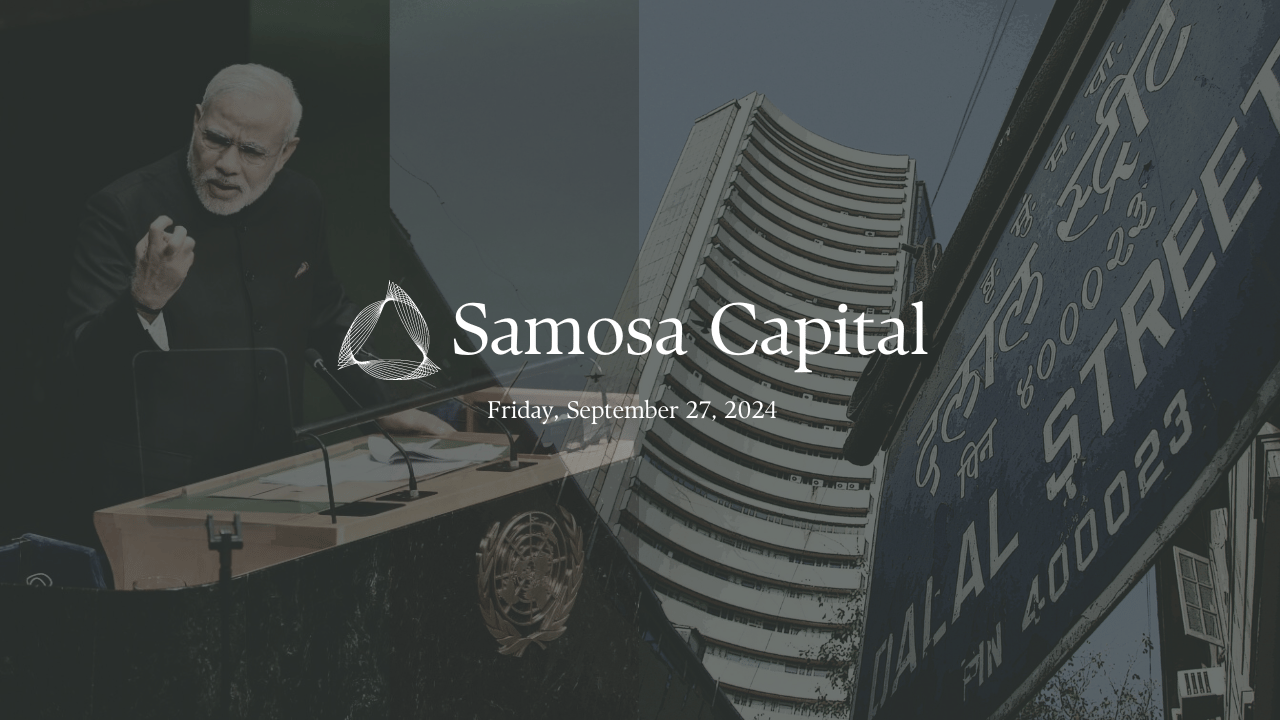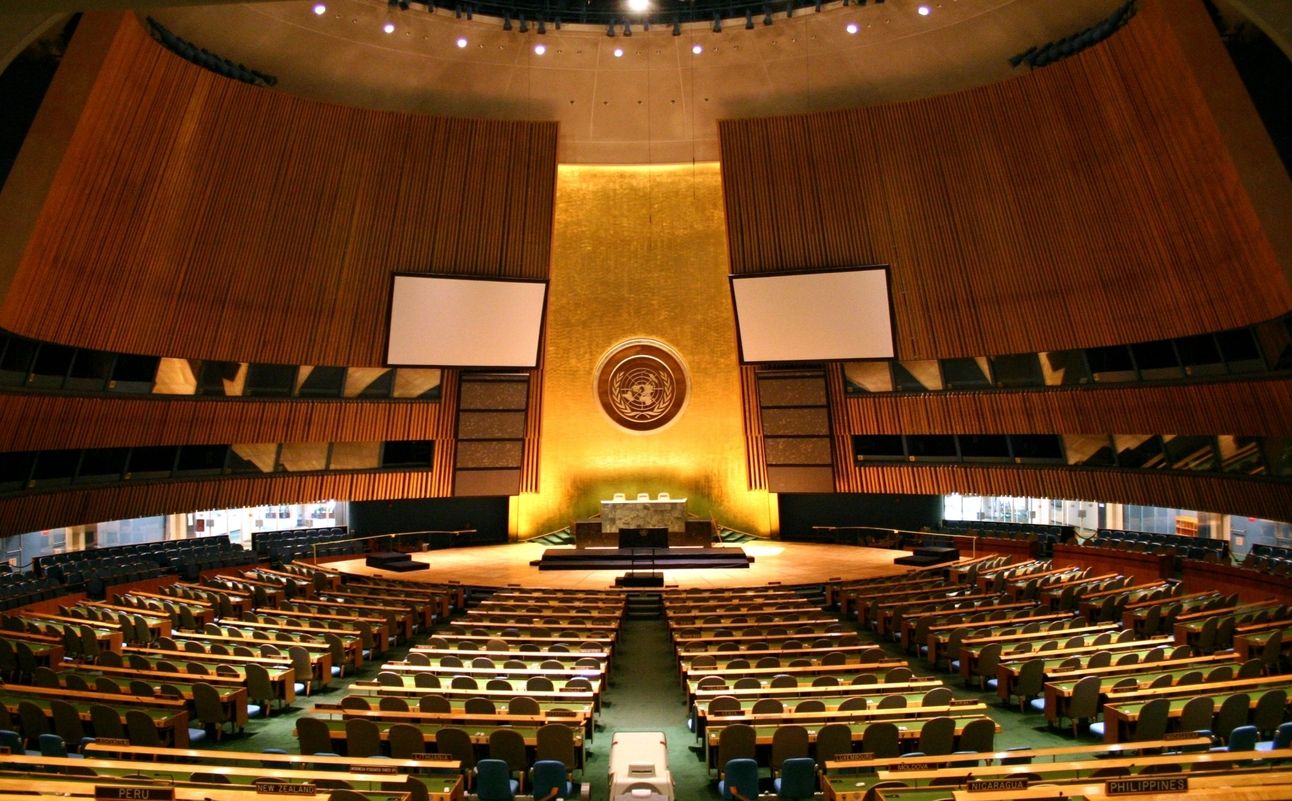
Hello. Indian equities with a Buy status have fallen to a decade low. And, this week’s United Nations conference in New York has pushed forward India’s bid to become a permanent member of the Security Council. We’ll investigate both and then close with Gupshup, a round-up of the most important headlines.
Earn a free ticket to our upcoming “Future of India” expert panel and networking event on November 7 in New York City by sharing Samosa Capital with three friends. Scroll to the bottom for your personal referral link.
BTW: Folk myths in Agra say the Taj Mahal is actually an incomplete work. Do you know what the finished monument was supposed to look like? (Answer at bottom)
Markets

Read here for an appendix on the above.
Analysis
Why Indian Stocks Are Losing Their Buy Status

Dalal Street in Mumbai is often referred to as India’s Wall Street
As of this week, the number of stocks on the NSE Nifty 200 index with a consensus ‘buy’ rating has plummeted to just 61, the lowest figure in at least a decade, according to data analyzed by Bloomberg. Prominent companies like LIC Housing Finance Ltd., Sun TV Network Ltd., and Dr. Lal PathLabs Ltd. have faced multiple downgrades this quarter, resulting in an average analyst rating of ‘hold’ for these stocks.
Analysts are increasingly skeptical about the prospects for further gains in Indian equities, which have enjoyed a remarkable nine-year rally. "Many stocks have now become obscenely expensive," noted Sahil Kapoor, a strategist at DSP Mutual Fund. With corporate earnings showing signs of slowing, analysts are rolling forward their earnings estimates amid weak sales growth and peak margins.
Currently, the Nifty 200 index is valued at approximately 24 times its 12-month forward earnings estimates, a sharp rise from the past decade's average of about 19 times. Kotak Institutional Equities predicts earnings growth for the benchmark Nifty 50 firms will decelerate to 8.4% for the fiscal year ending in March 2025, down from 20% last year.
Despite hitting record highs this year, concerns about expensive valuations are causing a shift in investor sentiment. While domestic and foreign investors have injected over $10 billion into local equities this quarter, the recent volatility and lackluster first-quarter earnings have prompted analysts to revise their ratings. Today, more than two-thirds of Nifty 200 stocks carry a ‘hold’ recommendation, reflecting a more cautious stance compared to nearly equal buy-and-hold ratings a decade ago.
Rajiv Batra, Head of Asia Pacific (ex-Japan/China) Equity Strategy at J.P. Morgan, expressed a more cautious outlook, stating, “An extreme heatwave followed by flooding has impacted demand, while earnings and growth in the last quarter have not met expectations.” He emphasized that the market has shifted to a range-bound trend, differing from the bullish momentum of previous years. “This is different from the situation we’ve had for the last three years.”
Wall Street titans remain confident that India remains a long-term play, with the highest forecasted GDP growth of any emerging market (as per the IMF), demographics tilted towards a young and healthy workforce, and an increasingly wealthy consumer market attracting the likes of Apple increasingly looking to sell its luxury-priced smartphones.
Explainer
India May Become a UN Security Council Permanent Member Soon

United Nations General Assembly in New York
In a speech to the Summit of the Future at the United Nations this week, U.S. Secretary of State Anthony Blinken told world leaders he supports reforming the United Nations Security Council and the United States continues its long-held endorsement of adding India, Japan, and Germany with permanent spots.
The current permanent members of the United Nations Security Council— the United States, Russia, China, the United Kingdom, and France—reflect the global power structure of the 1940s. However, the world is different today: the UK and France no longer rank among the top five economies, while Germany, India, and Japan do.
The United Kingdom and France have also backed India’s bid to join the council. India’s foreign minister S. Jaishanker has confirmed to The Hindu that India is likely to join the council soon.
The UN charter does not explain a clear way for a nation to become a permanent member, which will likely require an amendment that will need to be approved by two-thirds of the 193 UN member countries. However, the Security Council offers 10 non-permanent seats to countries elected by the General Assembly for a two-year term. India has been elected to a non-permanent seat the fourth highest number of times, after Japan, Brazil, and Argentina, in that order.
China opposes India (and Japan) joining the Security Council, as it threatens its vision to be Asia’s sole regional hegemon.
The permanent members of the UN Security Council hold a unique position due to their veto power over all resolutions passed by the General Assembly. While India's potential actions in this role remain uncertain, its most notable stance at the United Nations has been its consistent abstention from votes regarding resolutions related to Russia’s invasion of Ukraine.

Macro
Markets are unsure how RBI will act in the upcoming meeting (BBG). The RBI meeting in 2 weeks has become extremely difficult to predict, especially as three external members of the monetary policy committee are set to leave on October 4, days before the next policy-setting meeting, due to expiring contracts.
Expect interest rates for savings to fall soon (Economic Times). Though the RBI hasn’t cut yet, rates for pensions and national savings are likely to decrease in expectation of at least one if not multiple rate cuts from October to December.
NSE, BSE revise derivative transaction costs (Economic Times). Costs were lowered for single-stock derivatives to $40 per $125,000 of transactions. Costs for index derivatives are now $6.50 for $125,000 of transactions. The changes are being enacted as foreign inflow, particularly for derivative transactions, has grown in the last year.
Equities
Swiggy files for initial share-sale for $448M in new shares (BBG). Swiggy is seeking funds to invest further in its subsidiary Scootsy, an inter-city delivery system while expanding technology and cloud infrastructure investments.
Futures point to a strong finish for India in 2024 (BBG). Weak oil prices and growing hopes of an RBI cut have led to expectations that Indian equity markets will notch a 7th consecutive quarter of gains.
Ola Electric to ramp up growth (Economic Times). Ola plans to double service centers to 1,000 by December. They also want 100,000 trained mechanics within a year and roll out the Ola S1 within the same timeframe.
Alts
India increases debt financing as JPM flows continue to rise (BBG). October-March will see $80 billion of sovereign issuance, in line with budget estimates, spurred by foreign inflows. Bonds with 15-year tenor or more make up 52% of the issuance which could lead to the Indian yield curve steepening further (long-term rates rising faster than short-term).
HDFC sells $717M of home loans on book (BBG). Portfolios of housing loans are being sold to state-owned entities to reduce credit risk. A pool of car loans worth $1B was also sold off recently.
UBS is negotiating a joint venture with 360 One WAM to establish more wealth management services in India (Economic Times). India’s wealth management services industry has been growing rapidly due to the booming economy. The joint venture would help UBS target high net-worth individuals since they have only worked with the ultra-wealthy at this point.
Policy
China and India are reaching an agreement on troop removal from the shared Ladakh border (BBG). Indian foreign minister Jaishankar said 75% of disengagement has happened in Ladakh, while a spokesman for China’s defense ministry relayed that the two sides have narrowed differences. Ties along the border have been frozen since 20 Indians and an unknown number of Chinese troops died in a skirmish.
Pakistani PM Sharif raised issues with India’s expanding military and treatment of Kashmir at the UN (Economic Times). Sharif accused India of doing massive expansion of its military might and urged the country to reach a peaceful discussion of the Jammu-Kashmir issue.
Oh, and legends in the hometown of the Taj Mahal, Agra, say that a twin to the mausoleum was supposed to be built on the opposite side of the river in black marble, called the “Black Taj Mahal.” The Mughal emperor Shah Jahan who commissioned the Taj Mahal for his favorite wife is said to have gone bankrupt and became politically unpopular before the plans for the second Taj Mahal could be drawn up.
See you next week.
Disclaimer: This is not financial advice or recommendation for any investment. The Content is for informational purposes only, you should not construe any such information or other material as legal, tax, investment, financial, or other advice.
1 USD = 83.72 Indian Rupee